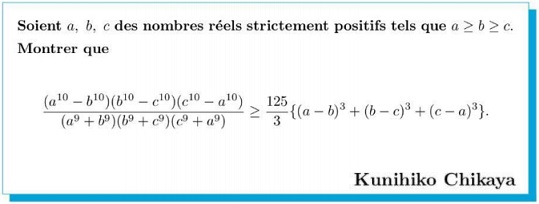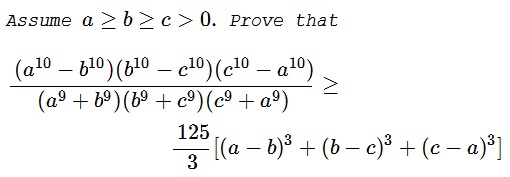Kunihiko Chikaya's Inequality
Source

Problem

Solution 1
Under the constraints, the inequality is equivalent to
$\displaystyle \small{\frac{(a^{10}-b^{10})(b^{10}-c^{10})(a^{10}-c^{10})}{(a^{9}+b^{9})(b^{9}+c^{9})(c^{9}+a^{9})}\ge\frac{125}{3}[(a-c)^3-(a-b)^3-(b-c)^3]}.$
But
$\displaystyle (a-c)^3-(a-b)^3-(b-c)^3=3(a-b)(b-c)(a-c).$
Hence, suffice it to show that
$\displaystyle \frac{(a^{10}-b^{10})(b^{10}-c^{10})(a^{10}-c^{10})}{(a^{9}+b^{9})(b^{9}+c^{9})(c^{9}+a^{9})}\ge 125(a-b)(b-c)(a-c).$
By the AM-GM inequality, employed repeatedly, or by Muirhead's inequality, employed just once,
$\displaystyle \frac{u^{10}-v^{10}}{u-v}\le 5(u^9+v^9).$
Substituting $a,b,c$ in pairs and taking the product proves the required inequality.
Solution 2
The $RHS$ simplifies to $125(a-b)(b-c)(c-a)$. If any two variables are equal, the inequality is trivially satisfied. Thus, we assume that no two variables are equal.
The constraint implies that both $LHS$ and $RHS$ are non-positive. Thus, we can negate both sides and flip the direction of the inequality. The inequality can then be written as
$\begin{align} &&\left[5(a-b)(a^9+b^9)\right]\left[5(b-c)(b^9+c^9)\right]\left[5(a-c)(a^9+c^9)\right] \\ &&\geq (a^{10}-b^{10}) (b^{10}-c^{10}) (a^{10}-c^{10}). \end{align}$
If we prove that for $x>y$,
$5(x-y)(x^9+y^9)\geq (x^{10}-y^{10}),$
we are done. Dropping the common positive factor $(x-y)$ the inequality becomes
$\displaystyle \begin{align} &5(x^9+y^9)-\sum_{i=0}^{9}x^iy^{9-i}\geq 0 \\ &[(x^9+y^9)-(x^8y+y^8x)]+[(x^9+y^9)-(x^7y^2+y^7x^2)]+ \\ &[(x^9+y^9)-(x^6y^3+y^6x^3)]+ [(x^9+y^9)-(x^5y^4+y^5x^4)]\geq 0. \end{align}$
Each box bracket is $\geq 0$ from Muirhead and the inequality follows.
Solution 3
The $RHS$ simplifies to $125(a-b)(b-c)(c-a)$. If any two variables are equal, the inequality is trivially satisfied. Thus, we assume that no two variables are equal.
The constraint implies that both $LHS$ and $RHS$ are non-positive. Thus, we can negate both sides and flip the direction of the inequality. The inequality can then be written as
$\begin{align} &&\left[5(a-b)(a^9+b^9)\right]\left[5(b-c)(b^9+c^9)\right]\left[5(a-c)(a^9+c^9)\right] \\ &&\geq (a^{10}-b^{10}) (b^{10}-c^{10}) (a^{10}-c^{10}). \end{align}$
If we prove that for $x>y$,
$5(x-y)(x^9+y^9)\geq (x^{10}-y^{10}),$
we are done. Dropping the common positive factor $(x-y)$ the inequality becomes
$\displaystyle 5(x^9+y^9)-\sum_{i=0}^{9}x^iy^{9-i}\geq 0.$
and follows from
$\displaystyle \begin{align} \sum_{i=0}^{9}x^iy^{9-i} &= \sum_{i=0}^{9}\left\{[x^9]^i[y^9]^{9-i}\right\}^{1/9} \leq\sum_{i=0}^{9} \frac{i\cdot x^9+(9-i)\cdot y^9}{9}~\text{(AM-GM)} \\ &= x^9\left(\frac{\displaystyle \sum_{i=0}^{9} i}{9}\right) + y^9\left(\frac{\displaystyle \sum_{i=0}^{9} (9-i)}{9}\right) \\ &= (x^9+y^9)\left(\frac{\displaystyle \sum_{i=0}^{9} i}{9}\right)= 5(x^9+y^9). \end{align}$
Solution 4
We can rewrite the rhs:
$rhs=\frac{125}{3} (-3 a^2 b+3 a^2 c+3 a b^2-3 a c^2-3 b^2 c+3 b c^2)$,
so:
$rhs=125 (a-b) (c-a) (b-c)$.
Since $\displaystyle \sum _{i=0}^{n-1} a^{n-i-1}b^i =\frac{a^n-b^n}{a-b}$ and with $n=10$,
$\displaystyle \sum _{i=0}^{n-1} a^{n-i-1}b^i\bigg|_{n=10} =\sum_{sym}a^5 b^4+\sum_{sym}a^6 b^3+\sum_{sym}a^7 b^2+\sum_{sym}a^8 b^1+\sum_{sym}a^9 b^0$
where $\displaystyle \sum_{sym}a^{p_1}b^{p_2}$ is the symmetric sum over all permutations $a^{p_1} b^{p_2}$.
So we need to prove that $a^{10}-b^{10}\geq 5 (a^9+b^9)(a-b)$ (cycl.)
By Miurhead's inequality,
$\displaystyle 5 \sum_{sym}a^9 b^0=5 (a^9 + b^9)\geq \sum_{sym}a^5 b^4+\sum_{sym}a^6 b^3+\sum_{sym}a^7 b^2+\sum_{sym}a^8 b^1+\sum_{sym}a^9 b^0$
We note for the nonpositive case $(c^{10}-a^{10})$, that it cancels out because $c-a$ is also nonpositive.
Solution 5
Multiplying both sides by $\displaystyle \underset {cycl} \sum a$, we write the initial equation as:
$ 4 \mathfrak{M}_{a,b,c,d}^{\{1,1,1,0\}}-8 \mathfrak{M}_{a,b,c,d}^{\{2,1,0,0\}}+4 \mathfrak{M}_{a,b,c,d}^{\{3,0,0,0\}} \geq0$
where $\mathfrak{M}_{a,b,c,d}^{\sigma=\{\sigma_1,\sigma_2,\sigma_3,\sigma_4\}}$ is the mean across all permutations $\sigma$. Less elegantly:
$\small{ (a b c+a b d+a c d+b c d)\\ -8 \left(\frac{a^2 b}{12}+\frac{a^2 c}{12}+\frac{a^2 d}{12}+\frac{a b^2}{12}+\frac{a c^2}{12}+\frac{a d^2}{12}+\frac{b^2 c}{12}+\frac{b^2 d}{12}+\frac{b c^2}{12}+\frac{b d^2}{12}+\frac{c^2 d}{12}+\frac{c d^2}{12}\right)\\ +\left(a^3+b^3+c^3+d^3\right) } $
We have from a generalization of Schur for 4 variables:
$(a-b) (a-c) (a-d) a^t+(b-a) (b-c) (b-d) b^t\\ +(c-a) (c-b) (c-d) c^t+(d-a) (d-b) (d-c) d^t\geq 0$
Which we can write the inequality using the $\mathfrak{M}$ notation as (for $t=0$):
$8 \mathfrak{M}_{a,b,c,d}^{\{1,1,1,0\}}-12 \mathfrak{M}_{a,b,c,d}^{\{2,1,0,0\}}+4 \mathfrak{M}_{a,b,c,d}^{\{3,0,0,0\}}\geq0$
and by Miurhead's inequality, since $\{2,1,0,0\}$ majorizes $\{1,1,1,0\}$, we have:
$ \mathfrak{M}_{a,b,c,d}^{\{2,1,0,0\}} \geq \mathfrak{M}_{a,b,c,d}^{\{1,1,1,0\}}$
which allows the final proof.
Solution 5'
Multiplying both sides by $\displaystyle \underset {cycl} \sum a$, we write the initial equation as:
$ 4 \mathfrak{M}_{a,b,c,d}^{\{1,1,1,0\}}-8 \mathfrak{M}_{a,b,c,d}^{\{2,1,0,0\}}+4 \mathfrak{M}_{a,b,c,d}^{\{3,0,0,0\}} \geq0$
where $\mathfrak{M}_{a,b,c,d}^{\sigma=\{\sigma_1,\sigma_2,\sigma_3,\sigma_4\}}$ is the mean across all permutations $\sigma$. Less elegantly:
$\small{ (a b c+a b d+a c d+b c d)\\ -8 \left(\frac{a^2 b}{12}+\frac{a^2 c}{12}+\frac{a^2 d}{12}+\frac{a b^2}{12}+\frac{a c^2}{12}+\frac{a d^2}{12}+\frac{b^2 c}{12}+\frac{b^2 d}{12}+\frac{b c^2}{12}+\frac{b d^2}{12}+\frac{c^2 d}{12}+\frac{c d^2}{12}\right)\\ +\left(a^3+b^3+c^3+d^3\right) } $
Using Shur's inequality:
$S_{x,y,z}^t=x^t (x-y) (x-z)+y^t (y-x) (y-z)+z^t (z-x) (z-y) \geq 0$
for $t=1$, and cycling:
$\displaystyle \underset {cycl} \sum S_{a,b,c}^t \geq 0$
which can be written as:
$\displaystyle 4 \mathfrak{M}_{a,b,c,d}^{\{1,1,1,0\}}-8 \mathfrak{M}_{a,b,c,d}^{\{2,1,0,0\}}+4 \mathfrak{M}_{a,b,c,d}^{\{3,0,0,0\}} \geq 0.$
Acknowledgment
Leo Giugiuc has kindly communicated to me the above problem by Kunihiko Chikaya, along with a solution of his. Solutions 2 and 3 are by Amit Itagi that make the references to Muirhead's and the AM-GM inequalities more explicit. Solutions 4, 5 and 5' are by N. N. Taleb
- A Cyclic But Not Symmetric Inequality in Four Variables $\left(\displaystyle 5(a+b+c+d)+\frac{26}{abc+bcd+cda+dab}\ge 26.5\right)$
- An Inequality with Constraint $\left((x+1)(y+1)(z+1)\ge 4xyz\right)$
- An Inequality with Constraints II $\left(\displaystyle abc+\frac{2}{ab+bc+ca}\ge\frac{5}{a^2+b^2+c^2}\right)$
- An Inequality with Constraint III $\left(\displaystyle \frac{x^3}{y^2}+\frac{y^3}{z^2}+\frac{z^3}{x^2}\ge 3\right)$
- An Inequality with Constraint IV $\left(\displaystyle\sum_{k=1}^{n}\sqrt{x_k}\ge (n-1)\sum_{k=1}^{n}\frac{1}{\sqrt{x_k}}\right)$
- An Inequality with Constraint VII $\left(|(2x+3y-5z)-3(x+y-5z)|=|-x+10z|\le\sqrt{101}\right)$
- An Inequality with Constraint VIII $\left(\sqrt{24a+1}+\sqrt{24b+1}+\sqrt{24c+1}\ge 15\right)$
- An Inequality with Constraint IX $\left(x^2+y^2\ge x+y\right)$
- An Inequality with Constraint X $\left((x+y+p+q)-(x+y)(p+q)\ge 1\right)$
- Problem 11804 from the AMM $\left(10|x^3 + y^3 + z^3 - 1| \le 9|x^5 + y^5 + z^5 - 1|\right)$
- Sladjan Stankovik's Inequality With Constraint $\left(abc+bcd+cda+dab-abcd\le\displaystyle \frac{27}{16}\right)$
- An Inequality with Constraint XII $\left(abcd\ge ab+bc+cd+da+ac+bd-5\right)$
- An Inequality with Constraint XIV $\left(\small{64(a^2+ab+b^2)(b^2+bc+c^2)(c^2+ca+a^2) \le 3(a+b+c)^6}\right)$
- An Inequality with Constraint XVII $\left(a^3+b^3+c^3\ge 0\right)$
- An Inequality with Constraint in Four Variables II $\left(a^3+b^3+c^3+d^3 + 6abcd \ge 10\right)$
- An Inequality with Constraint in Four Variables III $\left(\displaystyle\small{abcd+\frac{15}{2(ab+ac+ad+bc+bd+cd)}\ge\frac{9}{a^2+b^2+c^2+d^2}}\right)$
- An Inequality with Constraint in Four Variables V $\left(\displaystyle 5\sum \frac{abc}{\sqrt[3]{(1+a^3)(1+b^3)(1+c^3)}}\leq 4\right)$
- An Inequality with Constraint in Four Variables VI $\left(\displaystyle \sum_{cycl}a^2+6\cdot\frac{\displaystyle \sum_{cycl}abc}{\displaystyle \sum_{cycl}a}\ge\frac{5}{3}\sum_{sym}ab\right)$
- A Cyclic Inequality in Three Variables with Constraint $\left(\displaystyle a\sqrt{bc}+b\sqrt{ca}+c\sqrt{ab}+2abc=1\right)$
- Dorin Marghidanu's Cyclic Inequality with Constraint $\left(\displaystyle 2a^2-2\sqrt{2}(b+c)a+3b^2+4c^2-2\sqrt{bc}\gt 0\right)$
- Dan Sitaru's Cyclic Inequality In Three Variables with Constraints $\left(\displaystyle \frac{1}{\sqrt{a+b^2}}+ \frac{1}{\sqrt{b+c^2}}+ \frac{1}{\sqrt{c+a^2}}\ge\frac{1}{\sqrt{a+b+c}}\right)$
- Dan Sitaru's Cyclic Inequality In Three Variables with Constraints II $\left(\displaystyle \sum_{cycl}\frac{\displaystyle \frac{x}{y}+1+\frac{y}{x}}{\displaystyle \frac{1}{x}+\frac{1}{y}}\le 9\right)$
- Dan Sitaru's Cyclic Inequality In Three Variables with Constraints III $\left(\displaystyle 12+\sum_{cycl}\left(\sqrt{\frac{x^3}{y}}+\sqrt{\frac{x^3}{y}}\right)\ge 8(x+y+z)\right)$
- Inequality with Constraint from Dan Sitaru's Math Phenomenon $\left(\displaystyle b+2a+20\ge 2\sum_{cycl}\frac{a^2+ab+b^2}{a+b}\ge b+2c+20\right)$
- Another Problem from the 2016 Danubius Contest $\left(\displaystyle \frac{1}{a^2+2}+\frac{1}{b^2+2}+\frac{1}{c^2+2}\le 1\right)$
- Gireaux's Theorem (If a continuous function of several variables is defined on a hyperbrick and is convex in each of the variables, it attains its maximum at one of the corners)
- An Inequality with a Parameter and a Constraint $\left(\displaystyle a^4+b^4+c^4+\lambda abc\le\frac{\lambda +1}{27}\right)$
- Unsolved Problem from Crux Solved $\left(a_1a_2a_3a_4a_5a_6\le\displaystyle \frac{5}{2}\right)$
- An Inequality With Six Variables and Constraints Find the range of $\left(a^2+b^2+c^2+d^2+e^2+f^2\right)$
- Cubes Constrained $\left(3(a^4+b^4)+2a^4b^4\le 8\right)$
- Dorin Marghidanu's Inequality with Constraint $\left(\displaystyle \frac{1}{a_1+1}+\frac{2}{2a_2+1}+\frac{3}{3a_3+1}\ge 4\right)$
- Dan Sitaru's Integral Inequality with Powers of a Function $\left(\displaystyle\left(\int_0^1f^5(x)dx\right)\left(\int_0^1f^7(x)dx\right)\left(\int_0^1f^9(x)dx\right)\ge 2\right)$
- Michael Rozenberg's Inequality in Three Variables with Constraints $\left(\displaystyle 4\sum_{cycl}ab(a^2+b^2)\ge\sum_{cycl}a^4+5\sum_{cycl}a^2b^2+2abc\sum_{cycl}a\right)$
- Dan Sitaru's Cyclic Inequality In Three Variables with Constraints IV $\left(\displaystyle \frac{(4x^2y^2+1)(36y^2z^2+1)(9x^2z^2+1)}{2304x^2y^2z^2}\geq \frac{1}{(x+2y+3z)^2}\right)$
- Refinement on Dan Sitaru's Cyclic Inequality In Three Variables $\left(\displaystyle \frac{(4x^2y^2+1)(36y^2z^2+1)(9x^2z^2+1)}{2304x^2y^2z^2}\geq \frac{1}{3\sqrt{3}}\right)$
- An Inequality with Arbitrary Roots $\left(\displaystyle \sum_{cycl}\left(\sqrt[n]{a+\sqrt[n]{a}}+\sqrt[n]{a-\sqrt[n]{a}}\right)\lt 18\right)$
- Leo Giugiuc's Inequality with Constraint $\left(\displaystyle 2\left(\frac{1}{a+1}+\frac{1}{b+1}+\frac{1}{c+1}\right)\le ab+bc+ca\right)$
- Problem From the 2016 IMO Shortlist $\left(\displaystyle \sqrt[3]{(a^2+1)(b^2+1)(c^2+1)}\le\left(\frac{a+b+c}{3}\right)^2+1\right)$
- Dan Sitaru's Cyclic Inequality with a Constraint and Cube Roots $\left(\displaystyle \sum_{cycl}\sqrt[3]{\frac{abc}{(a+1)(b+1)(c+1)}}\le\frac{4}{5}\right)$
- Dan Sitaru's Cyclic Inequality with a Constraint and Cube Roots II $\left(\displaystyle \sqrt[3]{a}+\sqrt[3]{b}+\sqrt[3]{c}+\sqrt[3]{d}\le\sqrt[3]{abcd}\right)$
- A Simplified Version of Leo Giugiuc's Inequality from the AMM $\left(\displaystyle a^3+b^3+c^3\ge 3\right)$
- Kunihiko Chikaya's Inequality $\displaystyle \small{\left(\frac{(a^{10}-b^{10})(b^{10}-c^{10})(c^{10}-a^{10})}{(a^{9}+b^{9})(b^{9}+c^{9})(c^{9}+a^{9})}\ge\frac{125}{3}[(a-b)^3+(b-c)^3+(c-a)^3]\right)}$
- A Cyclic Inequality on [-1,1] $\left(xy+yz+zx\ge 1\right)$
- An Inequality with Two Triples of Variables $\left(\displaystyle\sum_{cycl}ux\ge\sqrt{\left(\sum_{cycl}xy\right)\left(2\sum_{cycl}uv-\sum_{cycl}u^2\right)}\right)$
- 6th European Mathematical Cup (2017), Junior Problem 4 $\left(x^3 - (y^2 + yz + z^2)x + y^2z + yz^2 \le 3\sqrt{3}\right)$
- Dorin Marghidanu's Example $\left(\displaystyle\frac{\displaystyle\frac{1}{b_1}+\frac{2}{b_2}+\frac{3}{b_3}}{1+2+3}\ge\frac{1+2+3}{b_1+2b_2+3b_3}\right)$
- A Trigonometric Inequality with Ordered Triple of Variables $\left((x+y)\sin x+(x-z)\sin y\lt (y+z)\sin x\right)$
- Three Variables, Three Constraints, Two Inequalities (Only One to Prove) - by Leo Giugiuc $\bigg(a+b+c=0$ and $a^2+b^2+c^2\ge 2$ Prove that $abc\ge 0\bigg)$
- Hung Nguyen Viet's Inequality with a Constraint $\left(1+2(xy+yz+zx)^2\ge (x^3+y^3+z^3+6xyz)^2\right)$
- A Cyclic Inequality by Seyran Ibrahimov $\left(\displaystyle \sum_{cycl}\frac{x}{y^4+y^2z^2+z^4}\le\frac{1}{(xyz)^2}\right)$
- Dan Sitaru's Cyclic Inequality In Three Variables with Constraints V $\left(\displaystyle \frac{1}{\sqrt{ab(a+b)}}+\frac{1}{\sqrt{bc(b+c)}}+\frac{1}{\sqrt{ca(c+a)}}\le 3+\frac{a+b+c}{abc}\right)$
- Cyclic Inequality In Three Variables From Kvant $\left(\displaystyle \frac{a}{bc+1}+\frac{b}{ca+1}+\frac{c}{ab+1}\le 2\right)$
- Cyclic Inequality In Three Variables From Vietnam by Rearrangement $\left(\displaystyle \frac{x^3+y^3}{y^2+z^2}+\frac{y^3+z^3}{z^2+x^2}+\frac{z^3+x^3}{x^2+y^2}\le 3\right)$
- A Few Variants of a Popular Inequality And a Generalization $\left(\displaystyle \frac{1}{(a+b)^2+4}+\frac{1}{(b+c)^2+4}+\frac{1}{(c+a)^2+4}\le \frac{3}{8}\right)$
- Two Constraints, One Inequality by Qing Song $\left(|a|+|b|+|c|\ge 6\right)$
- A Moscow Olympiad Question with Two Inequalities $\left(\displaystyle b^2\gt 4ac\right)$ A Problem form the Short List of the 2018 JBMO $\left(ab^3+bc^3+cd^3+da^3\ge a^2b^2+b^2c^2+c^2d^2+d^2a^2\right)$
- An Inequality from a Mongolian Exam $\left(\displaystyle 2\sum_{i=1}^{2n-1}(x_i-A)^2\ge \sum_{i=1}^{2n-1}(x_i-x_n)^2\right)$
![]()
|Contact| |Up| |Front page| |Contents| |Algebra|
Copyright © 1996-2018 Alexander Bogomolny73776046
